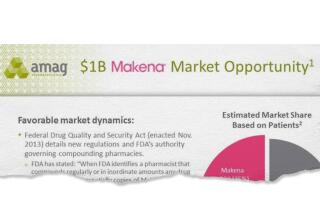Estrogen Drug Beneficial, Panel Decides
WASHINGTON — The benefits of using the estrogen-replacement drug Premarin in post-menopausal women who have had hysterectomies outweigh the risks, an advisory committee of the Food and Drug Administration concluded Friday.
Studies presented to the FDA’s Fertility and Maternal Health Drugs Advisory Committee showed that such women can decrease the danger of heart attack by about 50% by taking the drug. Heart disease kills about 240,000 American women annually.
Premarin, which currently is approved only for use in estrogen-replacement therapy, has had a controversial history.
The drug, manufactured by Wyeth-Ayerst Laboratories, is a form of the female hormone estrogen. It is used to prevent osteoporosis, a deterioration of bone mass, and to treat hot flashes, night sweats and other symptoms related to postmenopausal estrogen deficiency.
Premarin, taken by as many as 5 million American women, has been linked to cases of uterine cancer. As a result, some authorities oppose more widespread use of the drug.
Cynthia A. Pearson, a representative of the National Women’s Health Network, said the advisory committee should have refrained from reaching a conclusion in the absence of long-term random tests, which so far have not been conducted.
“Even though it may be true that estrogen decreases risks of heart disease, it hasn’t been shown conclusively,” she complained, adding that women’s health may be jeopardized if widespread use of the drug is encouraged without clear proof that it reduces the risk of heart attacks.
The advisory committee’s action could have far-reaching effects. According to statistics provided by Pearson’s group, 37% of all American women have hysterectomies by the age of 60. About 6 million women who have had hysterectomies already receive estrogen regularly.
The FDA will consider the committee’s conclusion and a request by Premarin’s manufacturer to cite the findings in its marketing. Although the advisory panel’s findings are not binding on the FDA, the agency rarely rejects a committee conclusion.
The committee action means that the information about Premarin’s affect on heart attacks in women who have had hysterectomies is “no longer only known to the scientific community,” said Dr. Marc W. Deitch, vice president for medical affairs at Wyeth-Ayerst.
If the FDA approves administration of Premarin for the prevention of heart attacks, the Philadelphia-based pharmaceutical company expects to double its sales of the drug, which totaled about $400 million last year.
The advisory committee also recommended further studies involving the use of Premarin.






